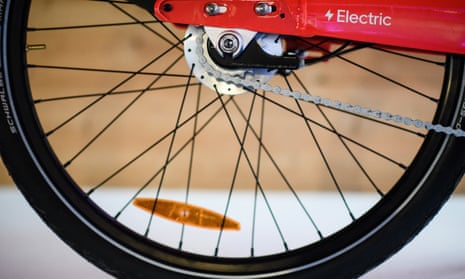Uber is to launch its electric bike hire scheme in the UK, trialling Jump bikes in London through its app.
The global ride-hailing firm will be battling with Lime for the e-bike market, after the retreat of dockless bicycle firms from the UK.
Uber will place 350 bright red e-bikes in Islington and hopes to expand to other London boroughs in the coming months.
Its Jump bikes have been available in the US and Canada and five other European cities, in some places also running e-scooter share schemes under the same brand – although they remain banned on British roads.
Uber users can find the GPS tracked e-bikes through the ride-hailing app, unlock them by scanning the QR code on the handlebars, at a cost of £1 then 12p per minute to ride. To avoid the dumping and cluttering that have angered councils, e-bike riders who try to park off-limits in protected areas such as stadiums, canals and Royal Parks will be notified automatically and fined £25 if they fail to move the bike.
The move is the latest expansion of Uber’s controversial model in London, where the firm recently started detailing public transport alternatives in its app. Regional general manager, Jamie Heywood, said it was “our goal to help people replace their car with their phone by offering a range of mobility options”.
Islington, the first council to allow Jump bikes, said the service would help people travel quickly, cheaply and conveniently around the borough. Local councillor Claudia Webbe said: “Shared electric bikes are accessible to many people of different ages and fitness levels and can help encourage even more people to switch to cycling, which is healthier and more environmentally friendly.”
Cycling UK said that e-bikes could allow people to commute further on two wheels. “More importantly, they’re an attractive option for those lacking the confidence to cycle, whether due to age, physical ability, health or otherwise,” said Duncan Dollimore, head of campaigns.
Although the permission to run the schemes mainly resides with the boroughs, Transport for London is understood to broadly welcome the initiative from Uber, with whom it has had a fraught relationship in the past – including over the renewal of its licence to operate private hire vehicles in 2017.
Uber has signed a memorandum of understanding with Islington on standards, including procedures for reporting bikes causing an obstruction. Bikes blocking pavements was a familiar complaint during the first influx of dockless bike schemes. Chinese firm Ofo announced its withdrawal from Sheffield, Norwich and London earlier this year, while rival Mobike has scaled back its ambitions in the UK, including withdrawing completely from Manchester after being shocked by the level of antisocial behaviour. Two other firms, Urbo and oBike, briefly operated in outer London boroughs without success.
Although TfL runs its own Santander cycle hire scheme using docks or bays around central London, it has welcomed the growth of apparently competing, dockless schemes as encouraging more cycling overall, with Santander hires reaching record numbers.
A TfL spokesperson said: “E-bikes have the potential to get many more people enjoying the benefits of cycling, helping us to reach our goal of making London the world’s best big city for cycling. They are a great way of quickly getting around the city and, in turn, will help to cut congestion and tackle poor air quality.”
Capital Challengers
Lime
The US micro-mobility firm made its name with e-scooters – but those are banned on UK streets. Its electric bike scheme launched in Milton Keynes last year, followed by Brent and Ealing in London, hireable for a £1 fee and 15p a minute.
Mobike
Scaled back operations in the UK for its dockless bikes, but still hanging in there in parts of the capital where other Chinese firms have exited. Long-term passes are available at 50p-£1 per 20 mins.
Santander Cycles
The TfL original, operating in central London, with bikes returned to fixed bays. £2 to unlock bikes for 24 hours, with the first 30 mins of cycling free.
Beryl
UK firm behind the green laser lights on bikes, now starting up a dockless bike share scheme in Bournemouth and Poole and currently being trialled by north London councillors in Enfield.









